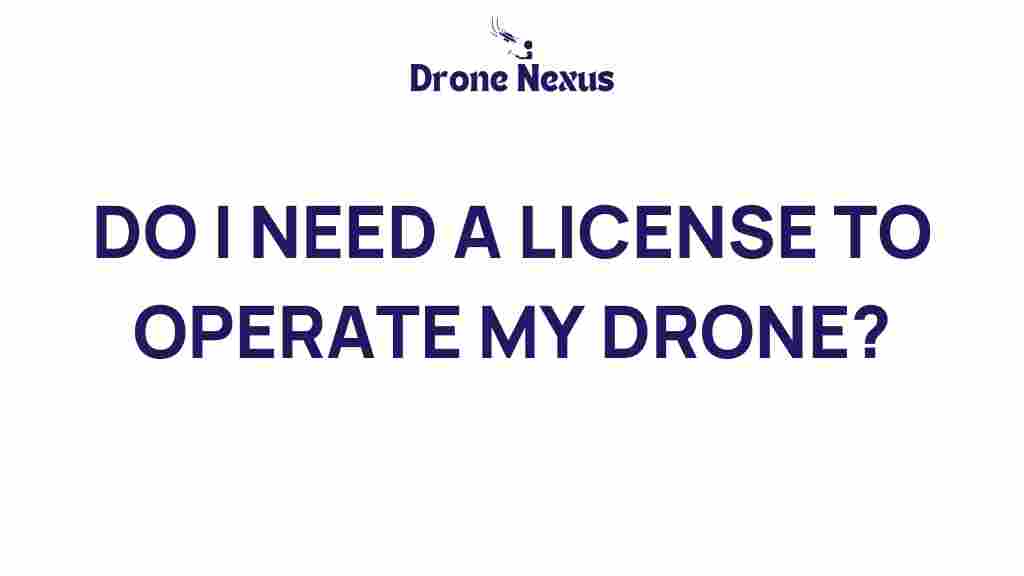Do You Need a License to Operate Your Drone? Understanding the Drone License
The rise of drones has revolutionized various industries, from photography to agriculture, but with this technological advancement comes the question of legality. One of the most asked questions by new and aspiring drone pilots is, “Do I need a drone license?” Navigating the regulations surrounding drone operation can be daunting. In this article, we will unravel the truth about drone licenses, detailing who needs one, how to obtain it, and what the consequences of flying without a license may be.
Understanding the Drone License
A drone license is an official certification that allows individuals to operate drones legally within specific jurisdictions. Whether you are flying for recreational or commercial purposes, understanding the need for a drone license is crucial. Here’s what you need to know:
- Regulatory Bodies: In many countries, aviation authorities, such as the Federal Aviation Administration (FAA) in the United States, govern drone usage.
- Types of Licenses: Different licenses cater to recreational users and commercial operators.
- Legal Implications: Operating without a valid drone license can lead to fines and legal action.
Who Needs a Drone License?
The requirement for a drone license varies based on the purpose of operation:
- Recreational Flyers: In the U.S., hobbyists flying drones weighing less than 55 pounds for recreational purposes do not need a license but must follow certain guidelines, including registering their drone.
- Commercial Operators: If you plan to use your drone for commercial purposes—such as aerial photography, surveying, or delivery services—you must obtain a Part 107 certification from the FAA.
How to Obtain a Drone License
Obtaining a drone license, particularly for commercial use, involves a series of steps. Here’s a step-by-step process to help you get started:
- Understand the Requirements: Familiarize yourself with the FAA regulations and requirements for obtaining a drone license.
- Study for the Exam: Prepare for the FAA’s Part 107 test by studying topics such as airspace classification, weather, and drone operations.
- Take the Test: Schedule and pass the FAA Part 107 test at an approved testing center.
- Apply for the Certificate: After passing the exam, apply for your Remote Pilot Certificate through the FAA.
- Maintain Your Certification: Stay informed about any changes in regulations and renew your certification as required.
Drone License Requirements in Different Countries
Each country has its own set of rules regarding drone licenses. Here’s a brief overview of regulations in various regions:
- United States: Requires a Part 107 certificate for commercial operations.
- Canada: Requires a Basic or Advanced Pilot Certificate based on the drone’s weight and intended use.
- European Union: Mandates a drone operator registration and a certificate of competence for pilots.
- Australia: Requires a Remote Pilot Licence (RePL) for commercial drone operations.
Potential Risks of Flying Without a Drone License
Operating a drone without the proper licensing can lead to several potential risks:
- Legal Consequences: You may face hefty fines or legal action from aviation authorities.
- Insurance Issues: Without a license, you might find it challenging to get insurance coverage for any damages caused during flight.
- Safety Risks: Unlicensed operators may not be familiar with best practices, increasing the risk of accidents.
Troubleshooting Common Issues
Here are some common issues drone pilots face and tips on how to troubleshoot them:
- Drone Not Responding: Ensure your remote control is charged and within range. Check for interference from other devices.
- Drone Flying Erratically: Calibrate the drone’s compass before flying and ensure the firmware is up to date.
- Loss of Signal: Maintain a clear line of sight with your drone and avoid flying in areas with potential interference from buildings or trees.
Best Practices for Drone Operation
To ensure safe and legal drone operation, consider the following best practices:
- Always Register Your Drone: If required by law, register your drone to avoid legal issues.
- Know Your Airspace: Familiarize yourself with the different classifications of airspace and any restrictions that may apply.
- Fly Within Visual Line of Sight: Always keep your drone within your line of sight to maintain control and ensure safety.
- Respect Privacy: Always respect the privacy of others when flying your drone.
Conclusion
In conclusion, understanding the requirements for a drone license is essential for both recreational and commercial drone pilots. While hobbyists may not need a license, they must still adhere to specific regulations. Commercial operators, however, must obtain a drone license to operate legally. By following the steps outlined in this article, you can ensure that you are compliant with local laws and that your drone flying experience is both enjoyable and safe. Remember, staying informed and adhering to best practices is key to responsible drone operation.
For more information on drone regulations in your area, visit the FAA’s official website. If you’re looking for additional resources on drone flying, check out our Drone Operation Guide.
This article is in the category Safety and created by DroneNexus Team
